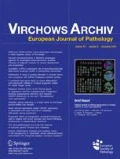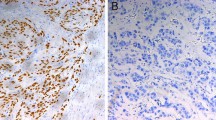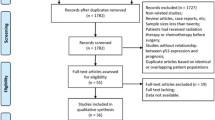Abstract
The tumour suppressor gene product p53 is believed to play an important role in the progression of human malignant tumours through mutation and over-expression. Using a microwave oven heating method, we have detected over-expression of p53 in buffered-formalin fixed, paraffin-embedded sections of oesophageal carcinomas immunohistochemically and examined the relationship between the p53 over-expression and postoperative survival. Employing a monoclonal antibody (pAb1801), nuclear p53 was detected in 56 of 105 (53%) tumour specimens. Homogeneous, heterogeneous, and focal immunostaining patterns were noted. No immunostaining was found in adjacent benign tissues. The results in buffered-formalin fixed sections were similar to those in the frozen sections. The cumulative survival rate of patients with p53 expression was significantly lower than that of the patients without expression (P<0.05), even though there were no significant differences between the clinicopathological features of the two groups. The results indicate that the nuclear accumulation of p53 might be an independent prognostic factor in patients with oesophageal squamous cell carcinomas.
Similar content being viewed by others
References
Baker SJ, Fearon ER, Nigro JM, Hamilton SR, Preisinger AC, Jessup JM, VanTuinen P, Ledbetter DH, Barker DF, Nakamura Y, White R, Vogelstein B (1989) Chromosome 17 deletions and p53 gene mutations in colorectal carcinomas. Science 244:217–221
Baker SJ, Markowitz S, Fearon ER, Willson JKV, Vogelstein B (1990) Suppression of human colorectal carcinoma cell growth by wild-type p53. Science 249:912–915
Banks L, Matlashewski G, Crawford L (1986) Isolation of humanp53-specific monoclonal antibodies and their use in the studies of human p53 expression. Eur J Biochem 159:529–534
Bartek J, Iggo R, Gannon J, Lane DP (1990a) Genetic and immunochemical analysis of mutant p53 in human breast cancer cell lines. Oncogene 5:893–899
Bartek J, Bartkova J, Vojtesek B, Staskova Z, Reijthar A, Kovarik J, Lane DP (1990b) Patterns of expression of the p53 tumour suppressor in human breast tissues and tumours in situ and in vitro. Int J Cancer 46:839–844
Bennett WP, Hollstein MC, He A, Zhu SM, Resau JH, Trump BF, Metcalf RA, Welsh JA, Midgley C, Lane DP, Harris CC (1991) Archival analysis of p53 genetic and protein alterations in Chinese oesophageal cancer. Oncogene 6:1779–1784
Cattoretti G, Rilke F, Andreola S, D'Amato L, Delia D (1988) p53 expression in breast cancer. Int J Cancer 41:178–183
Eliyahu D, Michalovitz D, Eliyahu S, Pinhasi-Kimhi O, Oren M (1989) Wild-type p53 can inhibit oncogene-mediated focus formation. Proc Natl Acad Sci USA 86:8763–8767
Finlay CA, Hinds PW, Levine AJ (1989) The p53 proto-oncogene can act as a suppressor of transformation. Cell 57:1083–1093
Hinds P, Finlay C, Levine AJ (1989) Mutation is required to activate the p53 gene for cooperation with theras oncogene and transformation. J Virol 63:739–746
Hollstein M, Sidransky D, Vogelstein B, Harris CC (1991) p53 mutations in human cancers. Science 253:49–53
Iggo R, Gatter K, Bartek J, Lane D, Harris AL (1990) Increased expression of mutant forms of p53 oncogene in primary lung cancer. Lancet 335:675–679
Isobe M, Emanuel BS, Givol D, Oren M, Croce CM (1986) Localization of gene for human p53 tumour antigen to band 17p13. Nature 320:84–85
Iwaya K, Tsuda H, Hiraide H, Tamaki K, Tamakuma S, Fukutomi T, Mukai K, Hirohashi S (1991) Nuclear p53 immunoreaction associated with poor prognosis of breast cancer. Jpn J Cancer Res 82:835–840
Kerns BJM, Jordan PA, Moore MBH, Humphrey PA, Berchuck A, Kohler MF, Bast RC, Iglehart JD, Marks JR (1992) p53 overexpression in formalin-fixed, paraffin-embedded tissue detected by immunohistochemistry. J Histochem Cytochem 40:1047–1051
Martin HM, Filipe MI, Morris RW, Lane DP, Silvestre F (1992) p53 expression and prognosis in gastric carcinoma. Int J Cancer 50:859–862
Nigro JM, Baker SJ, Preisinger AC, Jessup JM, Hostetter R, Cleary K, Binger SH, Davidson N, Baylin S, Devilee P, Glover T, Collins FS, Weston A, Modali R, Harris CC, Vogelstein B (1989) Mutations in the p53 gene occur in diverse human tumour types. Nature 342:705–708
Rodrigues NR, Rowan A, Smith ME, Kerr IB, Bodmer WF, Gannon JV, Lane DP (1990) P53 mutations in colorectal cancer. Proc Natl Acad Sci USA 87:7555–7559
Shi SR, Key ME, Kalra KL (1991) Antigen retrieval in formalin- fixed, paraffin-embedded tissues: an enhancement method for immunohistochemical staining based on microwave oven heating of tissue sections. J Histochem Cytochem 39:741–748
Takahashi T, Nau MM, Chiba I, Birrer MJ, Rosenberg RK, Vinocour M, Levitt M, Pass H, Gazdar AF, Minna JD (1989) p53: a frequent target for genetic abnormalities in lung cancer. Science 246:491–494
Tamura G, Maesawa C, Suzuki Y, Satodate R, Ishida K, Saito K (1992) p53 gene mutations in oesophageal cancer detected by polymerase chain reaction single-strand conformation polymorphism analysis. Jpn J Cancer Res 83:559–562
Thompson AM, Anderson TJ, Condie A, Prosser J, Chetty U, Carter DC, Evans HJ, Steel CM (1992) p53 allele losses, mutations and expression in breast cancer and their relationship to clinico-pathological parameters. Int J Cancer 50:528–532
Van den Berg FM, Tigges AJ, Schipper ME, Den Hartog-Jager FC, Kroes WG, Walboomers JM (1989) Expression of the nuclear oncogene p53 in colon tumours. J Pathol 157:193–199
Author information
Authors and Affiliations
Rights and permissions
About this article
Cite this article
Shimaya, K., Shiozaki, H., Inoue, M. et al. Significance of p53 expression as a prognostic factor in oesophageal squamous cell carcinoma. Vichows Archiv A Pathol Anat 422, 271–276 (1993). https://doi.org/10.1007/BF01608335
Received:
Revised:
Accepted:
Issue Date:
DOI: https://doi.org/10.1007/BF01608335




